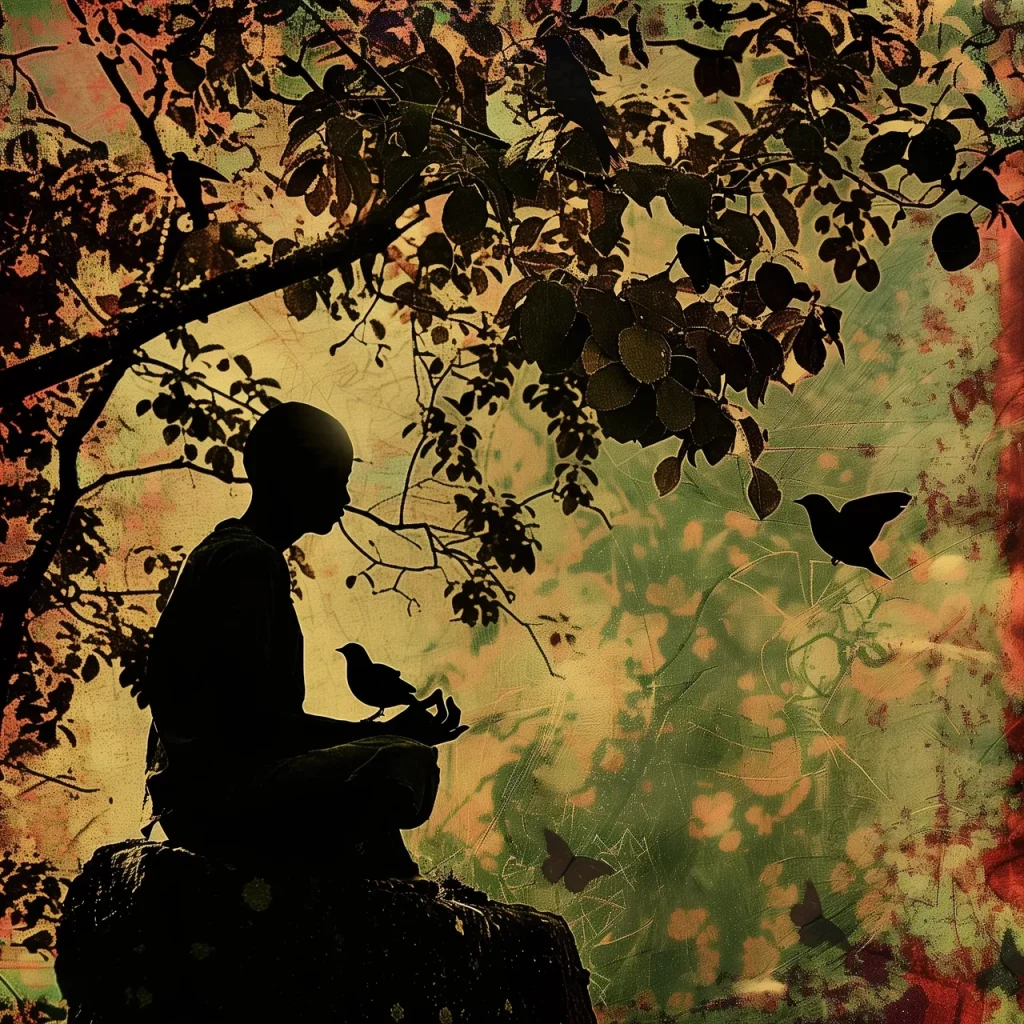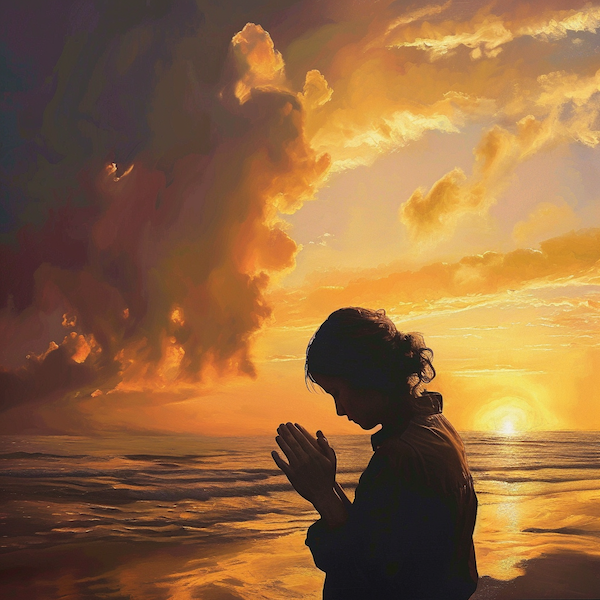Listen to the audio overview of my curation here.
Have you ever experienced an immediate and compelling attraction to someone, a feeling of familiarity that defies explanation? Or perhaps found yourself in a relationship characterized by intense emotional fluctuations and recurring negative patterns? If so, you may be encountering the concept of a karmic relationship, a significant idea explored in both psychological understanding and, with deeper insight, through the perspectives of Zen and Buddhist teachings.
My sister shared the above YouTube video on “The Karma Of Marriage Why You Marry Who You Marry – Zen And Buddhist Teachings”. So, I looked into the intricate dance between karma and marriage, drawing insights from psychological perspectives and the deep wisdom of Zen and Buddhism. What emerges is a fascinating understanding of how our past actions and unresolved issues can weave themselves into the very fabric of our most intimate connections.
Psychology describes karmic relationships as intense, often turbulent bonds that feel almost predestined. Think strong initial attraction coupled with emotional volatility and a persistent sense of obligation. These aren’t always the fairytale romances we envision, but rather relationships designed to bring forth crucial life lessons and address unfinished business, perhaps even echoes from lifetimes past. I think I was drawn to my husband because of unresolved childhood issues with my mother. Let me not elaborate on that.Let’s just say I felt my mother was too strict and distant to me.
I decided to delve deeper and understand myself by researching on other materials about this subject matter. The following text is the result of my curation with additional perspectives from my own life.

Let’s step into the serene yet sharp clarity of Zen and Buddhist thought. Here, marriage, like all encounters, is seen as deeply interwoven with the principle of karma – the immutable law of cause and effect. As the teachings remind us, “everything that has a beginning has a cause, and everything that arises arises dependent on something else.” Our marriages, therefore, aren’t random pairings. They are often the fruition of seeds planted long ago, shaped by our past intentions and actions.
More Than Just “Happily Ever After”: The Purpose of Karmic Unions
From this perspective, the intense pull we feel isn’t always about present-day love. Sometimes, it’s a “resonance,” a recognition of shared burdens or unresolved debts. Marriage becomes a potent crucible for growth, a meeting with the soul who, perhaps unknowingly, holds the key to unlocking our “unfinished work.” It’s about confronting our shadows, the aspects of ourselves we often refuse to see, reflected back to us through the mirror of our partner.
Navigating the Labyrinth: Signs of a Karmic Knot
How do we recognize these karmically charged unions? Here are some signposts illuminated by both psychological insights and Buddhist wisdom:
Instant Recognition, Intense Connection: That feeling of having met before, a powerful and immediate attraction that feels almost fated. Zen teachings might describe this as a recognition of past burdens rather than solely present love.
Emotional Storms: These relationships are often marked by significant emotional turbulence – intense highs followed by devastating lows, leaving you emotionally drained. I can relate to the challenges that came my way.
Recurring Conflicts: Familiar patterns of conflict resurface, echoing unresolved issues from the past, be it childhood or previous relationships. Marriage, in this context, acts as a mirror showing us what we resist acknowledging.
A Sense of Duty:
You might feel more obligated to stay than genuinely connected, a sense that you have to make it work, perhaps stemming from a feeling of “soul debt.” There was a time that I didn’t want to make my marraige work anymore but it led me to an accident where I broke my ankle in the process. This required surgery.
Push and Pull: Experiencing intense attraction and repulsion towards the same person can be a hallmark of a karmic entanglement.
Karmically Precise Mismatches: What appears illogical externally – different backgrounds, values, or desires – might be “karmically precise,” bringing together individuals to specifically address certain unresolved issues.

Beyond Romance: The Deeper Currents of Karma in Marriage
From a Zen and Buddhist standpoint, love isn’t always the foundation of marriage. Sometimes, the union is rooted in a “debt,” a “lesson,” or a “mirror” reflecting our deepest selves. The person we marry often carries our unresolved karma, not as punishment, but as a catalyst for learning.
Attraction, in this light, can be a recognition not of the soul’s inherent beauty, but of its burden. We might be drawn to someone who owes us a “debt of pain,” or to whom we owe one. Broken promises from past lives can draw souls together again, sometimes with reversed roles, illustrating the silent justice of karma. Even genuine love can become a battlefield if individuals meet before they are equally ready or evolved.
The Spiritual Partner: A Catalyst for Awakening
The purpose of a spiritual partner in marriage isn’t to complete us, but to trigger our unfinished work. They help us see our shadows, revealing wounds that need healing rather than simply soothing them. Ultimately, the goal isn’t just to find comfort but to become conscious, to achieve liberation not from each other, but from illusion.

A Word of Caution: The Pitfalls of the “Karmic” Label
While understanding the concept of karmic relationships can be insightful, psychology rightly cautions against using it as a justification for staying in harmful or abusive situations. Learning lessons should never come at the cost of your safety and well-being, mentally or physically.
Untangling the Knots: Ending and Transforming Karmic Cycles
Whether a karmic relationship is meant to end or evolve, the path forward involves conscious awareness. Reflecting on recurring patterns, conflicts, and emotions can illuminate the lessons we are meant to learn. Practices that symbolize closure, like writing and releasing, can be helpful. From a Buddhist perspective, letting go with compassion and without bitterness is key to breaking the karmic cycle. “Letting go is not failure. It is freedom.”
Transformation is also possible. With conscious effort, open communication, and perhaps professional guidance, some karmic relationships can evolve into more positive and balanced unions.
The Unseen Language: Karma’s Whispers in Marriage
Zen and Buddhist teachings emphasize that “karma never forgets what happens in marriage because marriage is not merely a ritual or agreement; it is a sacred mirror.” It reflects our most vulnerable and authentic selves. What truly matters is not the outward display of love, but the intention beneath it. Actions born of insincerity or negativity sow negative karmic seeds.
Our words, spoken in anger or resentment, are like arrows that can leave lasting wounds. Even silence – neglect, lack of appreciation, emotional withdrawal – can create deep karmic imprints. Unresolved pain within a marriage can even be passed down, becoming the inheritance of future generations unless consciously healed. I hope my unresolved pain won’t be passed down. It is one reason I am committed to the Camino de Santiago pilgrimmage.

The Mirror Within: Marriage and Self-Awareness
“Who you marry reflects who you are inside.” Marriage acts as a powerful magnifying glass, revealing our insecurities, our capacity for patience, and our ability to love or judge. Our partners often mirror our unhealed aspects, every insecurity and unresolved belief about our worth. True change comes not from trying to fix our partner, but from purifying our own minds. As the wisdom goes, “You don’t fix the mirror by shouting at it. You purify your own mind.” The relationship we have with ourselves dictates the quality of our external connections – the “marriage within.”

Beyond the Form: The Essence of Connection
Ultimately, Zen and Buddhist thought doesn’t idealize marriage as the ultimate destination but sees it as one of many vehicles for awakening. What truly matters is not whether a relationship lasts forever, but whether it fosters growth and self-awareness. The true goal is liberation, not from each other, but from the illusions that bind us.
Thinking about my 40 years of marriage and 7 years as sweethearts, it seems like all those years, the good times and the tough times, might have been about learning and growing together. The fact that we’re still together after so long suggests we’ve worked through whatever challenges came our way. It’s like we helped each other see things and maybe even resolved some old issues. So, our lasting marriage means we’ve navigated those ups and downs and built something strong over all this time. Our marriage is a constant work in progress.
Listen to the audio overview: The Karma of Marriage: A Buddhist Perspective
